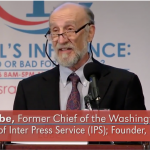by Jim Lobe
Lest anyone believe that Israel, particularly its national-security establishment, is united behind Prime Minister Benjamin Netanyahu’s opposition to the week-old Joint Comprehensive Plan of Action (JCPOA) between the P5+1 and Iran, Americans for Peace Now has set up a very helpful website featuring some quite authoritative voices of dissent.
I note this now not only because, as you all know, a number of major Jewish organizations, led by the American Israel Public Affairs Committee (AIPAC), have launched an all-out campaign that will not doubt cost tens of millions of dollars over the next couple of months to persuade enough members of Congress to reject the deal to overcome a promised Obama veto. Rather than reflect a little on the arguments made by the critics from Israel’s national-security establishment regarding how beneficial the JCPOA could prove to be, they have reflexively rallied behind the Israeli prime minister whose predictions regarding the U.S. invasion of Iraq, among many, many other things, turned out to be so catastrophic.
In a new analysis published Tuesday on the Daily Beast website, Jonathan Alter quotes the former head of Shin Beth, Ami Ayalon, as telling him:
[W]hen it comes to Iran’s nuclear capability, this [deal] is the best option.
When negotiations began, Iran was two months away from acquiring enough material for a [nuclear] bomb. Now it will be 12 months,” Ayalon says, and the difference is significant to anyone with a background in intelligence. “Israelis are failing to distinguish between reducing Iran’s nuclear capability and Iran being the biggest devil in the Middle East.
…It’s very easy to play with fears in a fearful society.
At the same time, the Ynet website translated an op-ed by Efraim Halevy, the former head of Mossad, published earlier this week in Hebrew. He argues:
Iran made concessions in a series of critical matters – it loathed the actual detailed discussion of its nuclear plans, and it has been hit with serious restrictions for the next 10 to 15 years. In the Middle East, a decade is eternity. Iran was also forced to agree to an invasive and unique supervision regime like no other in the world. The agreement even allows inspections at sites which supreme leader Ali Khamenei announced that he would not let inspectors into. In addition, the agreement sets a – complex but clear – process giving a forum with a clear Western majority the possibility of restoring the sanctions even without Russia and China’s consent. And this is only a partial list of the concessions.
…[B]efore we storm Capitol Hill, led by the Israeli ambassador to Washington, it’s important to hold a profound debate in Israel on whether no agreement is preferable to an agreement which includes components that are crucial for Israel’s security. There will be no other agreement and no other negotiations. What is better, a signed agreement or no agreement?
When such past custodians of Israel’s security speak out so strongly against the prime minister, one might think that major U.S. Jewish organizations might pause and ponder a little before plunging into a campaign that will almost certainly do damage to their influence and relationship with the Obama administration, not to mention with the more enduring Democratic Party, which still holds the loyalty of a strong majority of the Jewish community in this country. But that is not what AIPAC and the Anti-Defamation League have done. When Bibi said, “Jump,” they jumped.
In any event, those who want to hear dissenting voices in the Israeli national security establishment may want to bookmark APN’s webpage.
Photo: Ami Ayalon






4 major opposition parties Israel have joined Bibi trying to prevent this Iranian deal. That leaves only the far left and the Arab coalition to weigh in. So it seems, a very large majority of Israeli’s think an ounce of prevention now is worth many many pounds of weapon graded plutonium in the future.
Good distraction from the Palestinian issue. And second, Israel has gas reserves of its own which it announced discovering in 2010 I believe. They can’t possibly complete with a sanction-free, economically empowered Iran which has the most gas reserves in the world and will be in a much better position, if the deal goes through, to export their gas to Europe.